Consumer Law: Analysis of Legal Rules on Goods and Services
VerifiedAdded on 2023/01/13
|8
|2437
|85
Report
AI Summary
This report provides a comprehensive analysis of consumer law, focusing on the rights of consumers and the legal framework governing the sale of goods and services. It examines the Consumer Rights Act 2015 and its implications for both buyers and sellers, particularly in cases of faulty goods. The report delves into the legal rules surrounding implied terms, the transfer of property and possession, and the remedies available to both buyers and sellers in the event of contract breaches. Furthermore, it applies product liability statutory provisions to scenarios involving faulty goods, assessing the responsibilities of manufacturers and retailers. The report uses a case study to illustrate these concepts, offering practical advice on how consumers can seek redress for defective products and services. The analysis covers various aspects, including consumer rights, property possession, liability for faulty goods, and remedies for both buyers and sellers, ultimately aiming to clarify the legal protections afforded to consumers in the UK.

Costumers Are The
Most Important People
Of The Business
Most Important People
Of The Business
Paraphrase This Document
Need a fresh take? Get an instant paraphrase of this document with our AI Paraphraser
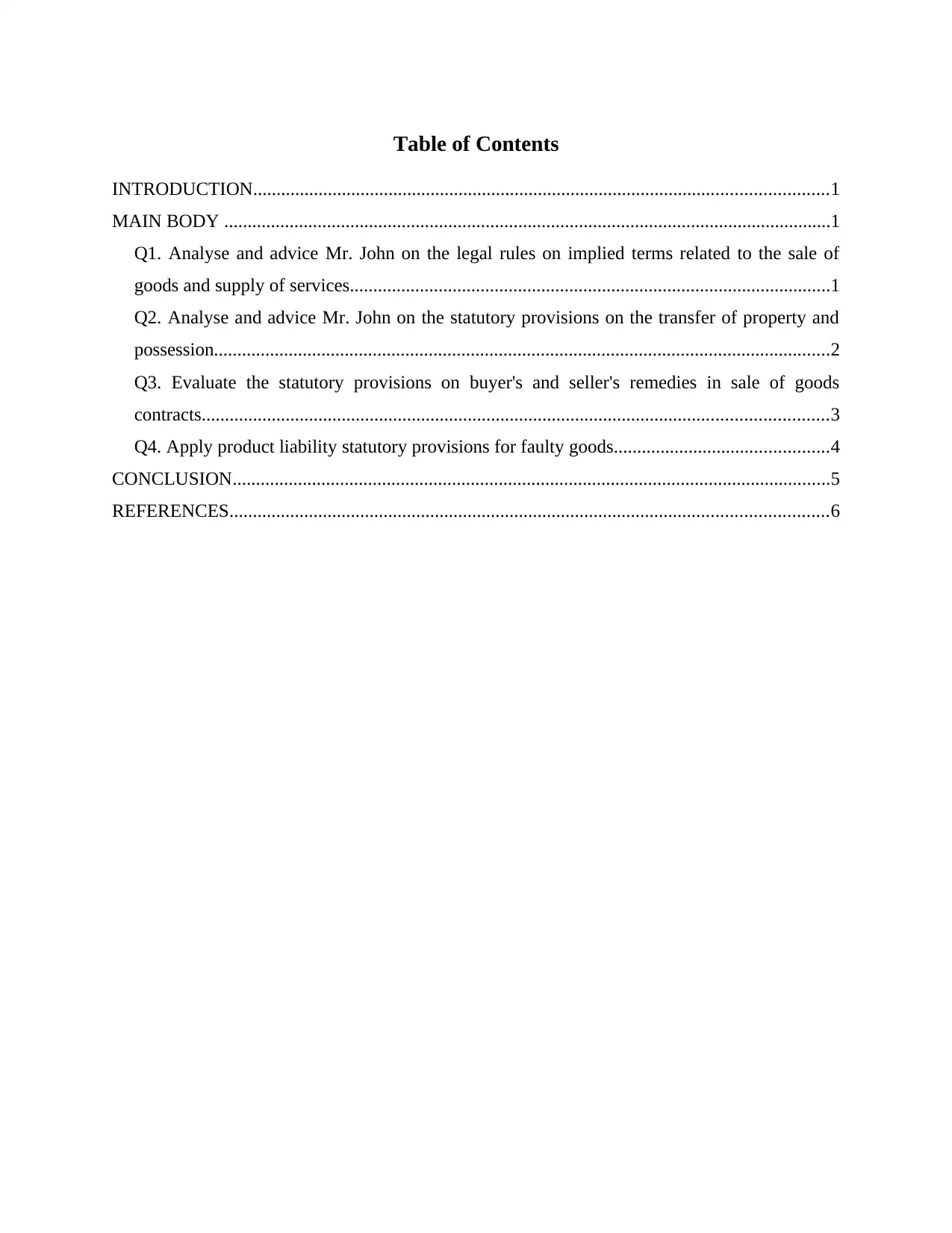
Table of Contents
INTRODUCTION...........................................................................................................................1
MAIN BODY ..................................................................................................................................1
Q1. Analyse and advice Mr. John on the legal rules on implied terms related to the sale of
goods and supply of services.......................................................................................................1
Q2. Analyse and advice Mr. John on the statutory provisions on the transfer of property and
possession....................................................................................................................................2
Q3. Evaluate the statutory provisions on buyer's and seller's remedies in sale of goods
contracts......................................................................................................................................3
Q4. Apply product liability statutory provisions for faulty goods..............................................4
CONCLUSION................................................................................................................................5
REFERENCES................................................................................................................................6
INTRODUCTION...........................................................................................................................1
MAIN BODY ..................................................................................................................................1
Q1. Analyse and advice Mr. John on the legal rules on implied terms related to the sale of
goods and supply of services.......................................................................................................1
Q2. Analyse and advice Mr. John on the statutory provisions on the transfer of property and
possession....................................................................................................................................2
Q3. Evaluate the statutory provisions on buyer's and seller's remedies in sale of goods
contracts......................................................................................................................................3
Q4. Apply product liability statutory provisions for faulty goods..............................................4
CONCLUSION................................................................................................................................5
REFERENCES................................................................................................................................6
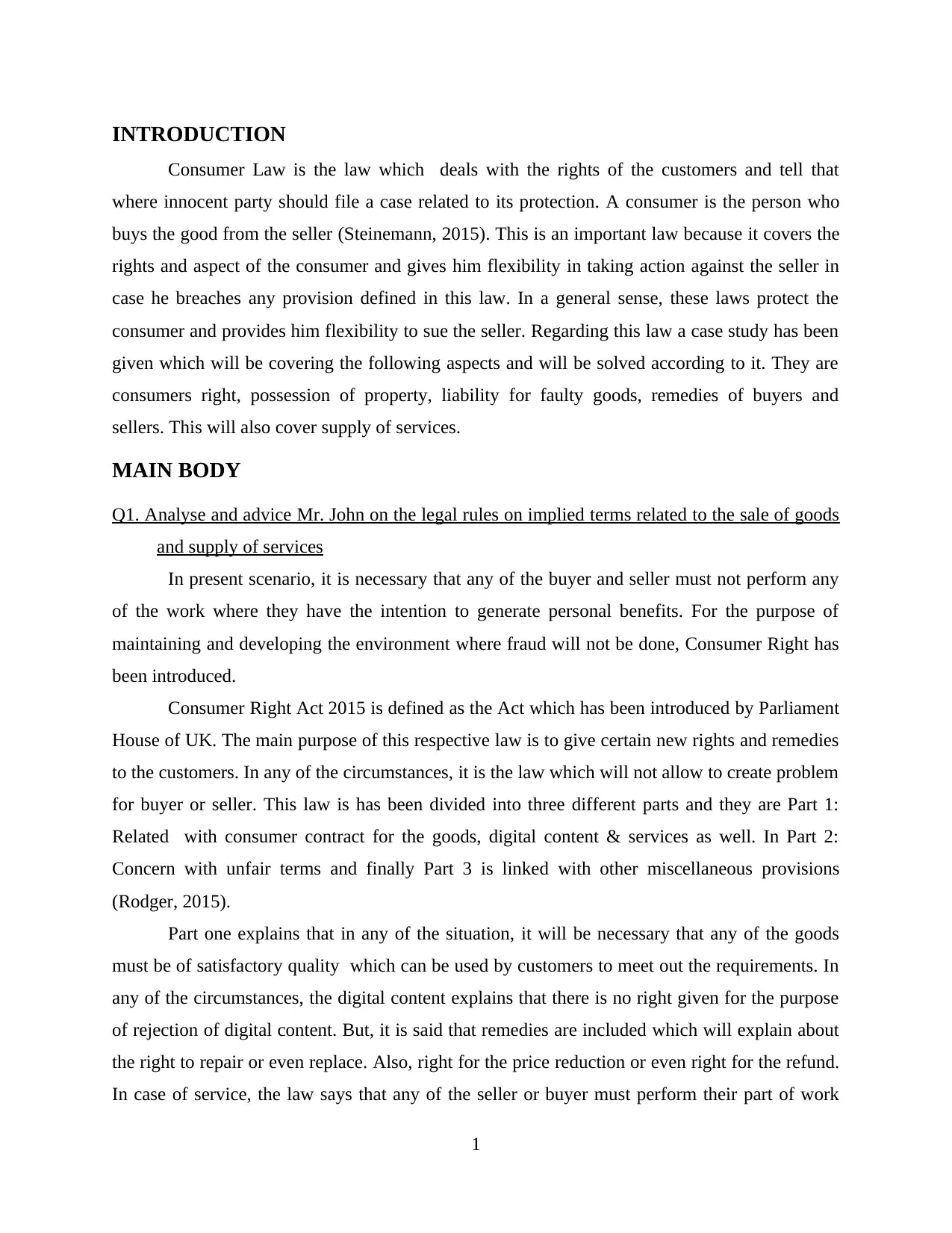
INTRODUCTION
Consumer Law is the law which deals with the rights of the customers and tell that
where innocent party should file a case related to its protection. A consumer is the person who
buys the good from the seller (Steinemann, 2015). This is an important law because it covers the
rights and aspect of the consumer and gives him flexibility in taking action against the seller in
case he breaches any provision defined in this law. In a general sense, these laws protect the
consumer and provides him flexibility to sue the seller. Regarding this law a case study has been
given which will be covering the following aspects and will be solved according to it. They are
consumers right, possession of property, liability for faulty goods, remedies of buyers and
sellers. This will also cover supply of services.
MAIN BODY
Q1. Analyse and advice Mr. John on the legal rules on implied terms related to the sale of goods
and supply of services
In present scenario, it is necessary that any of the buyer and seller must not perform any
of the work where they have the intention to generate personal benefits. For the purpose of
maintaining and developing the environment where fraud will not be done, Consumer Right has
been introduced.
Consumer Right Act 2015 is defined as the Act which has been introduced by Parliament
House of UK. The main purpose of this respective law is to give certain new rights and remedies
to the customers. In any of the circumstances, it is the law which will not allow to create problem
for buyer or seller. This law is has been divided into three different parts and they are Part 1:
Related with consumer contract for the goods, digital content & services as well. In Part 2:
Concern with unfair terms and finally Part 3 is linked with other miscellaneous provisions
(Rodger, 2015).
Part one explains that in any of the situation, it will be necessary that any of the goods
must be of satisfactory quality which can be used by customers to meet out the requirements. In
any of the circumstances, the digital content explains that there is no right given for the purpose
of rejection of digital content. But, it is said that remedies are included which will explain about
the right to repair or even replace. Also, right for the price reduction or even right for the refund.
In case of service, the law says that any of the seller or buyer must perform their part of work
1
Consumer Law is the law which deals with the rights of the customers and tell that
where innocent party should file a case related to its protection. A consumer is the person who
buys the good from the seller (Steinemann, 2015). This is an important law because it covers the
rights and aspect of the consumer and gives him flexibility in taking action against the seller in
case he breaches any provision defined in this law. In a general sense, these laws protect the
consumer and provides him flexibility to sue the seller. Regarding this law a case study has been
given which will be covering the following aspects and will be solved according to it. They are
consumers right, possession of property, liability for faulty goods, remedies of buyers and
sellers. This will also cover supply of services.
MAIN BODY
Q1. Analyse and advice Mr. John on the legal rules on implied terms related to the sale of goods
and supply of services
In present scenario, it is necessary that any of the buyer and seller must not perform any
of the work where they have the intention to generate personal benefits. For the purpose of
maintaining and developing the environment where fraud will not be done, Consumer Right has
been introduced.
Consumer Right Act 2015 is defined as the Act which has been introduced by Parliament
House of UK. The main purpose of this respective law is to give certain new rights and remedies
to the customers. In any of the circumstances, it is the law which will not allow to create problem
for buyer or seller. This law is has been divided into three different parts and they are Part 1:
Related with consumer contract for the goods, digital content & services as well. In Part 2:
Concern with unfair terms and finally Part 3 is linked with other miscellaneous provisions
(Rodger, 2015).
Part one explains that in any of the situation, it will be necessary that any of the goods
must be of satisfactory quality which can be used by customers to meet out the requirements. In
any of the circumstances, the digital content explains that there is no right given for the purpose
of rejection of digital content. But, it is said that remedies are included which will explain about
the right to repair or even replace. Also, right for the price reduction or even right for the refund.
In case of service, the law says that any of the seller or buyer must perform their part of work
1
⊘ This is a preview!⊘
Do you want full access?
Subscribe today to unlock all pages.

Trusted by 1+ million students worldwide
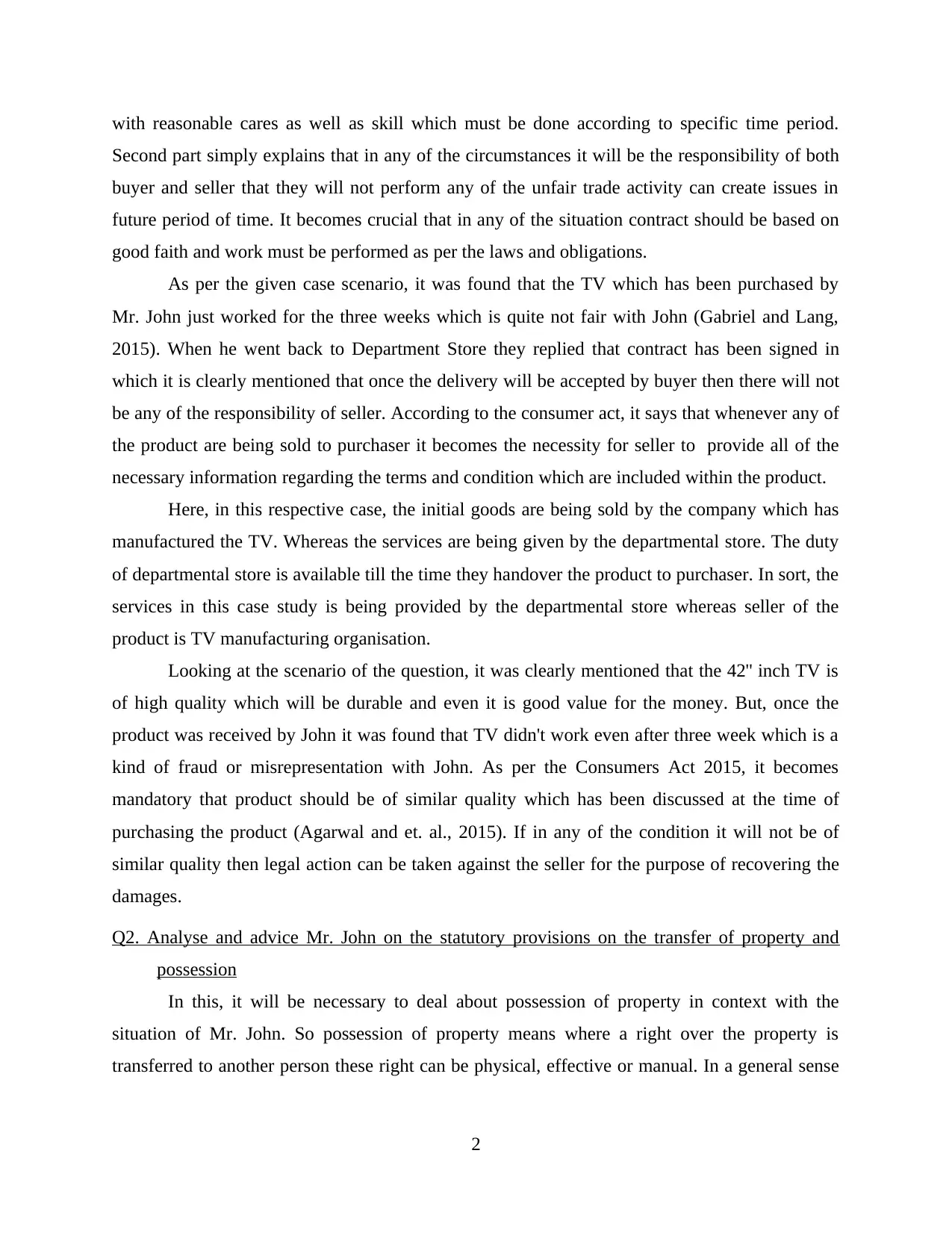
with reasonable cares as well as skill which must be done according to specific time period.
Second part simply explains that in any of the circumstances it will be the responsibility of both
buyer and seller that they will not perform any of the unfair trade activity can create issues in
future period of time. It becomes crucial that in any of the situation contract should be based on
good faith and work must be performed as per the laws and obligations.
As per the given case scenario, it was found that the TV which has been purchased by
Mr. John just worked for the three weeks which is quite not fair with John (Gabriel and Lang,
2015). When he went back to Department Store they replied that contract has been signed in
which it is clearly mentioned that once the delivery will be accepted by buyer then there will not
be any of the responsibility of seller. According to the consumer act, it says that whenever any of
the product are being sold to purchaser it becomes the necessity for seller to provide all of the
necessary information regarding the terms and condition which are included within the product.
Here, in this respective case, the initial goods are being sold by the company which has
manufactured the TV. Whereas the services are being given by the departmental store. The duty
of departmental store is available till the time they handover the product to purchaser. In sort, the
services in this case study is being provided by the departmental store whereas seller of the
product is TV manufacturing organisation.
Looking at the scenario of the question, it was clearly mentioned that the 42'' inch TV is
of high quality which will be durable and even it is good value for the money. But, once the
product was received by John it was found that TV didn't work even after three week which is a
kind of fraud or misrepresentation with John. As per the Consumers Act 2015, it becomes
mandatory that product should be of similar quality which has been discussed at the time of
purchasing the product (Agarwal and et. al., 2015). If in any of the condition it will not be of
similar quality then legal action can be taken against the seller for the purpose of recovering the
damages.
Q2. Analyse and advice Mr. John on the statutory provisions on the transfer of property and
possession
In this, it will be necessary to deal about possession of property in context with the
situation of Mr. John. So possession of property means where a right over the property is
transferred to another person these right can be physical, effective or manual. In a general sense
2
Second part simply explains that in any of the circumstances it will be the responsibility of both
buyer and seller that they will not perform any of the unfair trade activity can create issues in
future period of time. It becomes crucial that in any of the situation contract should be based on
good faith and work must be performed as per the laws and obligations.
As per the given case scenario, it was found that the TV which has been purchased by
Mr. John just worked for the three weeks which is quite not fair with John (Gabriel and Lang,
2015). When he went back to Department Store they replied that contract has been signed in
which it is clearly mentioned that once the delivery will be accepted by buyer then there will not
be any of the responsibility of seller. According to the consumer act, it says that whenever any of
the product are being sold to purchaser it becomes the necessity for seller to provide all of the
necessary information regarding the terms and condition which are included within the product.
Here, in this respective case, the initial goods are being sold by the company which has
manufactured the TV. Whereas the services are being given by the departmental store. The duty
of departmental store is available till the time they handover the product to purchaser. In sort, the
services in this case study is being provided by the departmental store whereas seller of the
product is TV manufacturing organisation.
Looking at the scenario of the question, it was clearly mentioned that the 42'' inch TV is
of high quality which will be durable and even it is good value for the money. But, once the
product was received by John it was found that TV didn't work even after three week which is a
kind of fraud or misrepresentation with John. As per the Consumers Act 2015, it becomes
mandatory that product should be of similar quality which has been discussed at the time of
purchasing the product (Agarwal and et. al., 2015). If in any of the condition it will not be of
similar quality then legal action can be taken against the seller for the purpose of recovering the
damages.
Q2. Analyse and advice Mr. John on the statutory provisions on the transfer of property and
possession
In this, it will be necessary to deal about possession of property in context with the
situation of Mr. John. So possession of property means where a right over the property is
transferred to another person these right can be physical, effective or manual. In a general sense
2
Paraphrase This Document
Need a fresh take? Get an instant paraphrase of this document with our AI Paraphraser
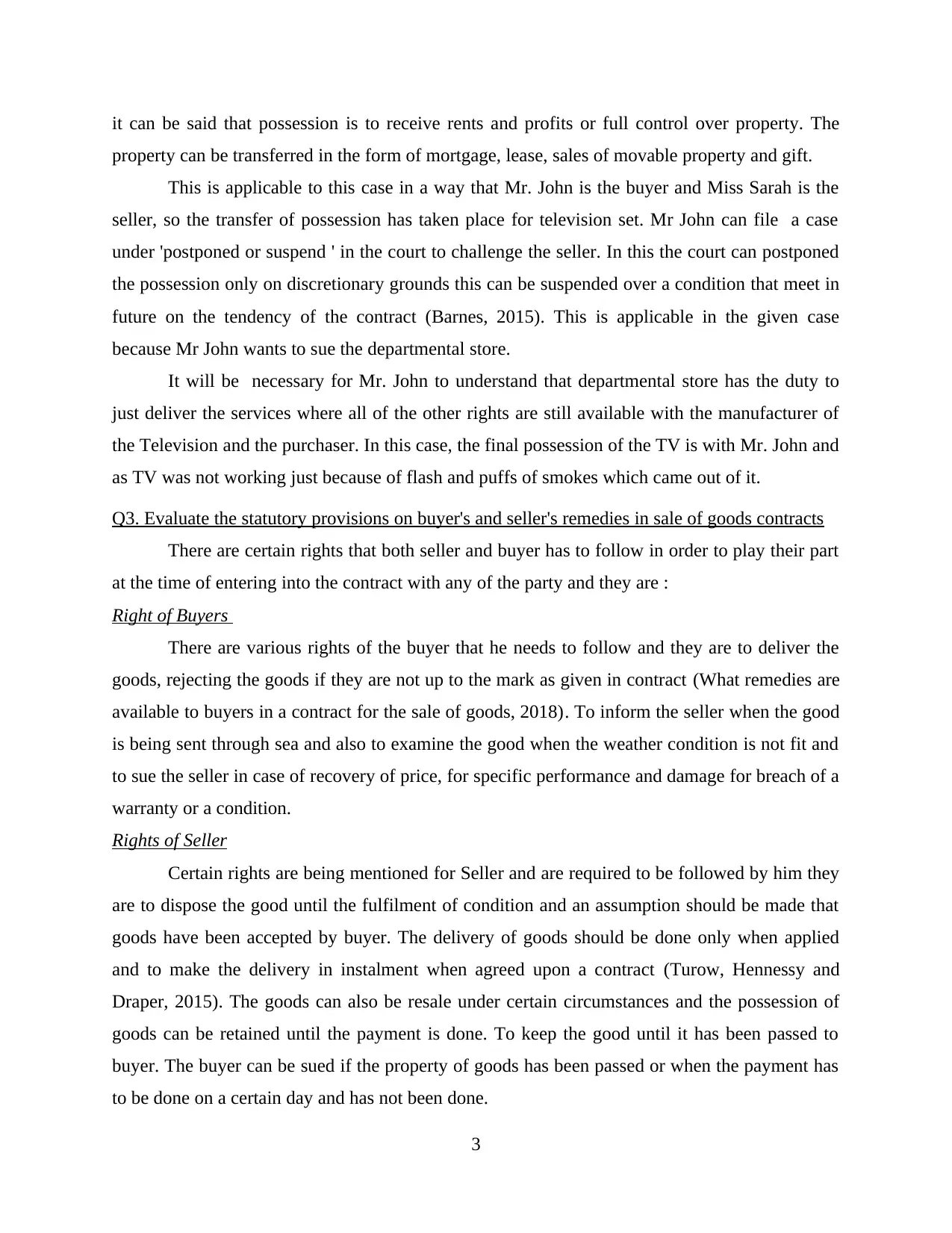
it can be said that possession is to receive rents and profits or full control over property. The
property can be transferred in the form of mortgage, lease, sales of movable property and gift.
This is applicable to this case in a way that Mr. John is the buyer and Miss Sarah is the
seller, so the transfer of possession has taken place for television set. Mr John can file a case
under 'postponed or suspend ' in the court to challenge the seller. In this the court can postponed
the possession only on discretionary grounds this can be suspended over a condition that meet in
future on the tendency of the contract (Barnes, 2015). This is applicable in the given case
because Mr John wants to sue the departmental store.
It will be necessary for Mr. John to understand that departmental store has the duty to
just deliver the services where all of the other rights are still available with the manufacturer of
the Television and the purchaser. In this case, the final possession of the TV is with Mr. John and
as TV was not working just because of flash and puffs of smokes which came out of it.
Q3. Evaluate the statutory provisions on buyer's and seller's remedies in sale of goods contracts
There are certain rights that both seller and buyer has to follow in order to play their part
at the time of entering into the contract with any of the party and they are :
Right of Buyers
There are various rights of the buyer that he needs to follow and they are to deliver the
goods, rejecting the goods if they are not up to the mark as given in contract (What remedies are
available to buyers in a contract for the sale of goods, 2018). To inform the seller when the good
is being sent through sea and also to examine the good when the weather condition is not fit and
to sue the seller in case of recovery of price, for specific performance and damage for breach of a
warranty or a condition.
Rights of Seller
Certain rights are being mentioned for Seller and are required to be followed by him they
are to dispose the good until the fulfilment of condition and an assumption should be made that
goods have been accepted by buyer. The delivery of goods should be done only when applied
and to make the delivery in instalment when agreed upon a contract (Turow, Hennessy and
Draper, 2015). The goods can also be resale under certain circumstances and the possession of
goods can be retained until the payment is done. To keep the good until it has been passed to
buyer. The buyer can be sued if the property of goods has been passed or when the payment has
to be done on a certain day and has not been done.
3
property can be transferred in the form of mortgage, lease, sales of movable property and gift.
This is applicable to this case in a way that Mr. John is the buyer and Miss Sarah is the
seller, so the transfer of possession has taken place for television set. Mr John can file a case
under 'postponed or suspend ' in the court to challenge the seller. In this the court can postponed
the possession only on discretionary grounds this can be suspended over a condition that meet in
future on the tendency of the contract (Barnes, 2015). This is applicable in the given case
because Mr John wants to sue the departmental store.
It will be necessary for Mr. John to understand that departmental store has the duty to
just deliver the services where all of the other rights are still available with the manufacturer of
the Television and the purchaser. In this case, the final possession of the TV is with Mr. John and
as TV was not working just because of flash and puffs of smokes which came out of it.
Q3. Evaluate the statutory provisions on buyer's and seller's remedies in sale of goods contracts
There are certain rights that both seller and buyer has to follow in order to play their part
at the time of entering into the contract with any of the party and they are :
Right of Buyers
There are various rights of the buyer that he needs to follow and they are to deliver the
goods, rejecting the goods if they are not up to the mark as given in contract (What remedies are
available to buyers in a contract for the sale of goods, 2018). To inform the seller when the good
is being sent through sea and also to examine the good when the weather condition is not fit and
to sue the seller in case of recovery of price, for specific performance and damage for breach of a
warranty or a condition.
Rights of Seller
Certain rights are being mentioned for Seller and are required to be followed by him they
are to dispose the good until the fulfilment of condition and an assumption should be made that
goods have been accepted by buyer. The delivery of goods should be done only when applied
and to make the delivery in instalment when agreed upon a contract (Turow, Hennessy and
Draper, 2015). The goods can also be resale under certain circumstances and the possession of
goods can be retained until the payment is done. To keep the good until it has been passed to
buyer. The buyer can be sued if the property of goods has been passed or when the payment has
to be done on a certain day and has not been done.
3
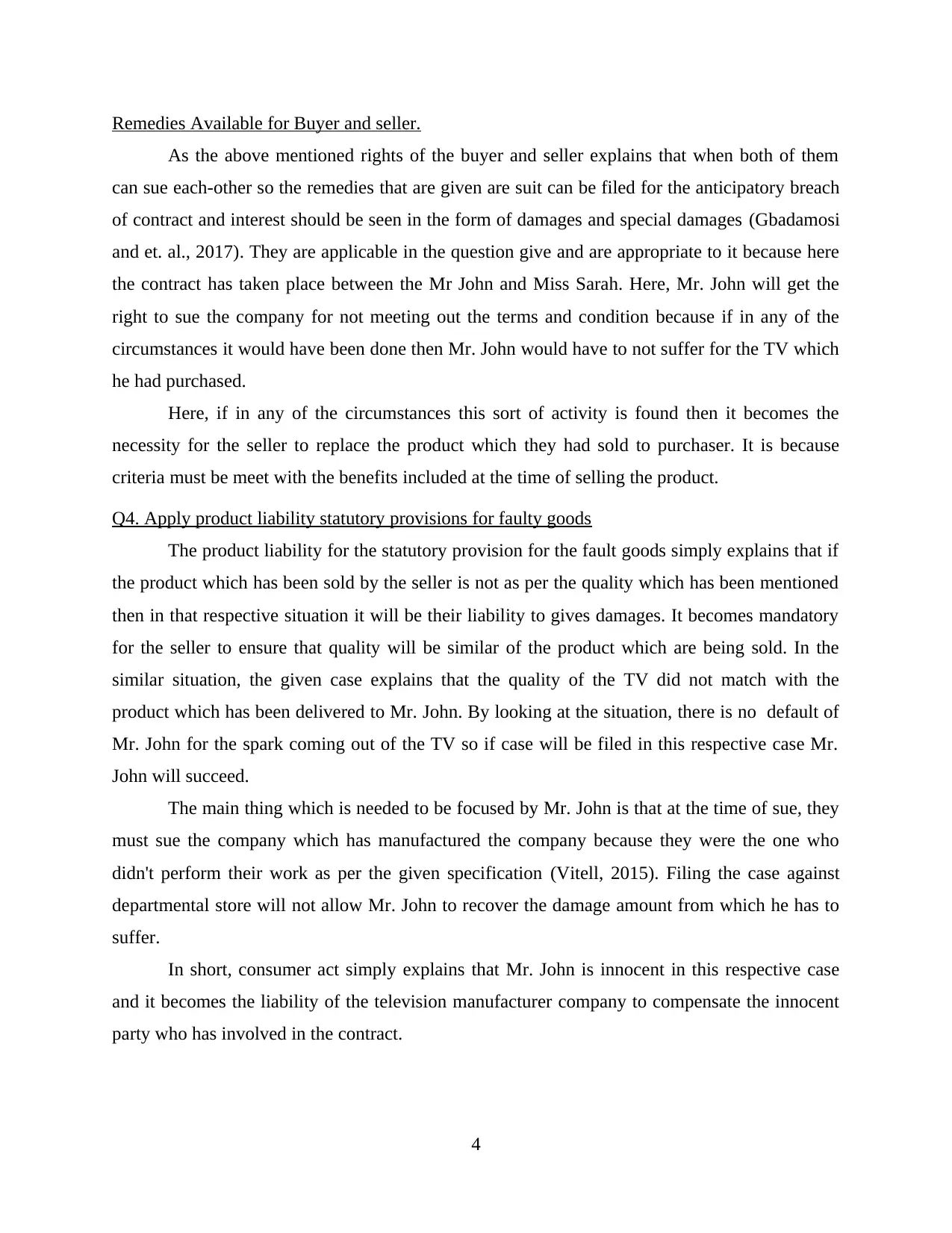
Remedies Available for Buyer and seller.
As the above mentioned rights of the buyer and seller explains that when both of them
can sue each-other so the remedies that are given are suit can be filed for the anticipatory breach
of contract and interest should be seen in the form of damages and special damages (Gbadamosi
and et. al., 2017). They are applicable in the question give and are appropriate to it because here
the contract has taken place between the Mr John and Miss Sarah. Here, Mr. John will get the
right to sue the company for not meeting out the terms and condition because if in any of the
circumstances it would have been done then Mr. John would have to not suffer for the TV which
he had purchased.
Here, if in any of the circumstances this sort of activity is found then it becomes the
necessity for the seller to replace the product which they had sold to purchaser. It is because
criteria must be meet with the benefits included at the time of selling the product.
Q4. Apply product liability statutory provisions for faulty goods
The product liability for the statutory provision for the fault goods simply explains that if
the product which has been sold by the seller is not as per the quality which has been mentioned
then in that respective situation it will be their liability to gives damages. It becomes mandatory
for the seller to ensure that quality will be similar of the product which are being sold. In the
similar situation, the given case explains that the quality of the TV did not match with the
product which has been delivered to Mr. John. By looking at the situation, there is no default of
Mr. John for the spark coming out of the TV so if case will be filed in this respective case Mr.
John will succeed.
The main thing which is needed to be focused by Mr. John is that at the time of sue, they
must sue the company which has manufactured the company because they were the one who
didn't perform their work as per the given specification (Vitell, 2015). Filing the case against
departmental store will not allow Mr. John to recover the damage amount from which he has to
suffer.
In short, consumer act simply explains that Mr. John is innocent in this respective case
and it becomes the liability of the television manufacturer company to compensate the innocent
party who has involved in the contract.
4
As the above mentioned rights of the buyer and seller explains that when both of them
can sue each-other so the remedies that are given are suit can be filed for the anticipatory breach
of contract and interest should be seen in the form of damages and special damages (Gbadamosi
and et. al., 2017). They are applicable in the question give and are appropriate to it because here
the contract has taken place between the Mr John and Miss Sarah. Here, Mr. John will get the
right to sue the company for not meeting out the terms and condition because if in any of the
circumstances it would have been done then Mr. John would have to not suffer for the TV which
he had purchased.
Here, if in any of the circumstances this sort of activity is found then it becomes the
necessity for the seller to replace the product which they had sold to purchaser. It is because
criteria must be meet with the benefits included at the time of selling the product.
Q4. Apply product liability statutory provisions for faulty goods
The product liability for the statutory provision for the fault goods simply explains that if
the product which has been sold by the seller is not as per the quality which has been mentioned
then in that respective situation it will be their liability to gives damages. It becomes mandatory
for the seller to ensure that quality will be similar of the product which are being sold. In the
similar situation, the given case explains that the quality of the TV did not match with the
product which has been delivered to Mr. John. By looking at the situation, there is no default of
Mr. John for the spark coming out of the TV so if case will be filed in this respective case Mr.
John will succeed.
The main thing which is needed to be focused by Mr. John is that at the time of sue, they
must sue the company which has manufactured the company because they were the one who
didn't perform their work as per the given specification (Vitell, 2015). Filing the case against
departmental store will not allow Mr. John to recover the damage amount from which he has to
suffer.
In short, consumer act simply explains that Mr. John is innocent in this respective case
and it becomes the liability of the television manufacturer company to compensate the innocent
party who has involved in the contract.
4
⊘ This is a preview!⊘
Do you want full access?
Subscribe today to unlock all pages.

Trusted by 1+ million students worldwide
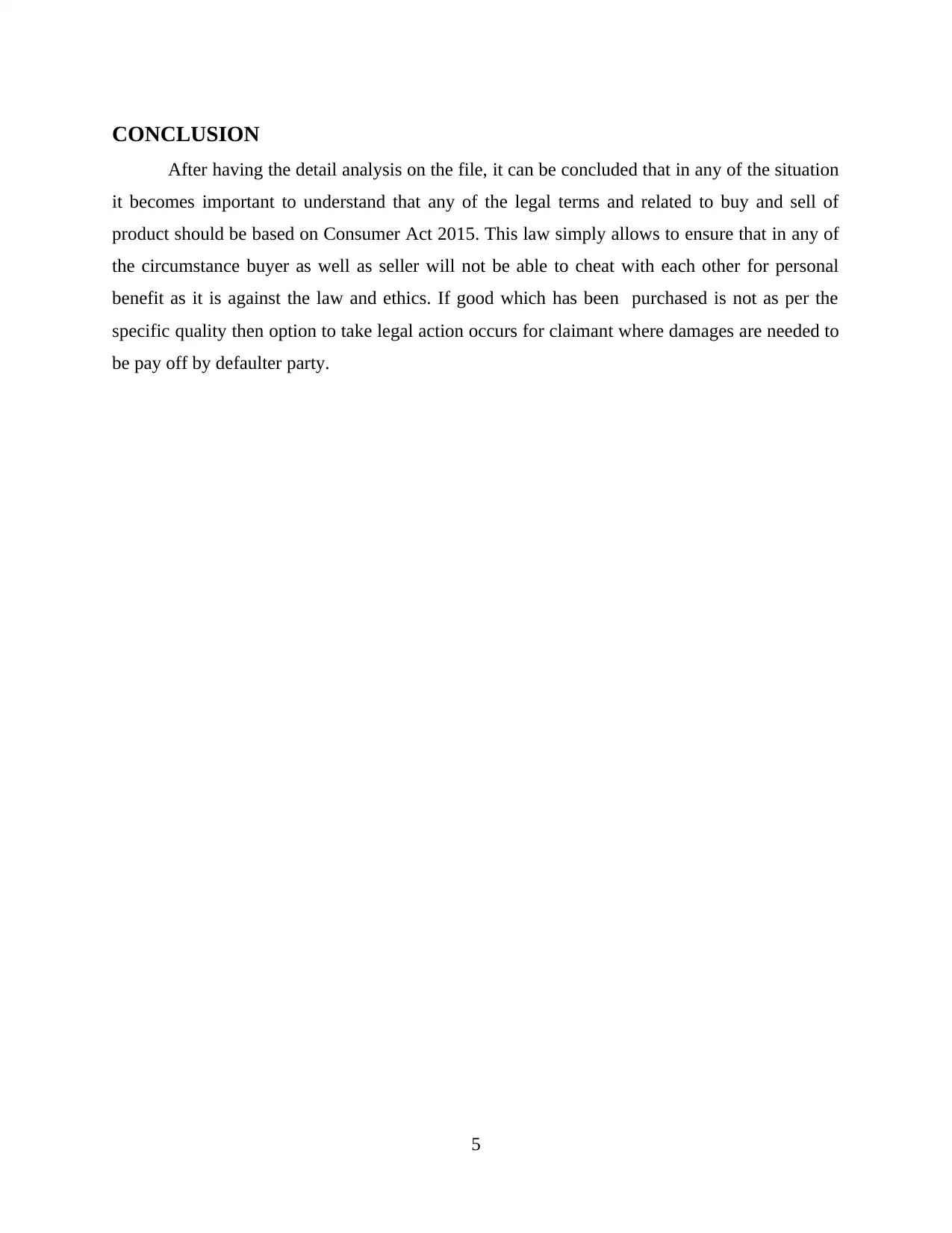
CONCLUSION
After having the detail analysis on the file, it can be concluded that in any of the situation
it becomes important to understand that any of the legal terms and related to buy and sell of
product should be based on Consumer Act 2015. This law simply allows to ensure that in any of
the circumstance buyer as well as seller will not be able to cheat with each other for personal
benefit as it is against the law and ethics. If good which has been purchased is not as per the
specific quality then option to take legal action occurs for claimant where damages are needed to
be pay off by defaulter party.
5
After having the detail analysis on the file, it can be concluded that in any of the situation
it becomes important to understand that any of the legal terms and related to buy and sell of
product should be based on Consumer Act 2015. This law simply allows to ensure that in any of
the circumstance buyer as well as seller will not be able to cheat with each other for personal
benefit as it is against the law and ethics. If good which has been purchased is not as per the
specific quality then option to take legal action occurs for claimant where damages are needed to
be pay off by defaulter party.
5
Paraphrase This Document
Need a fresh take? Get an instant paraphrase of this document with our AI Paraphraser
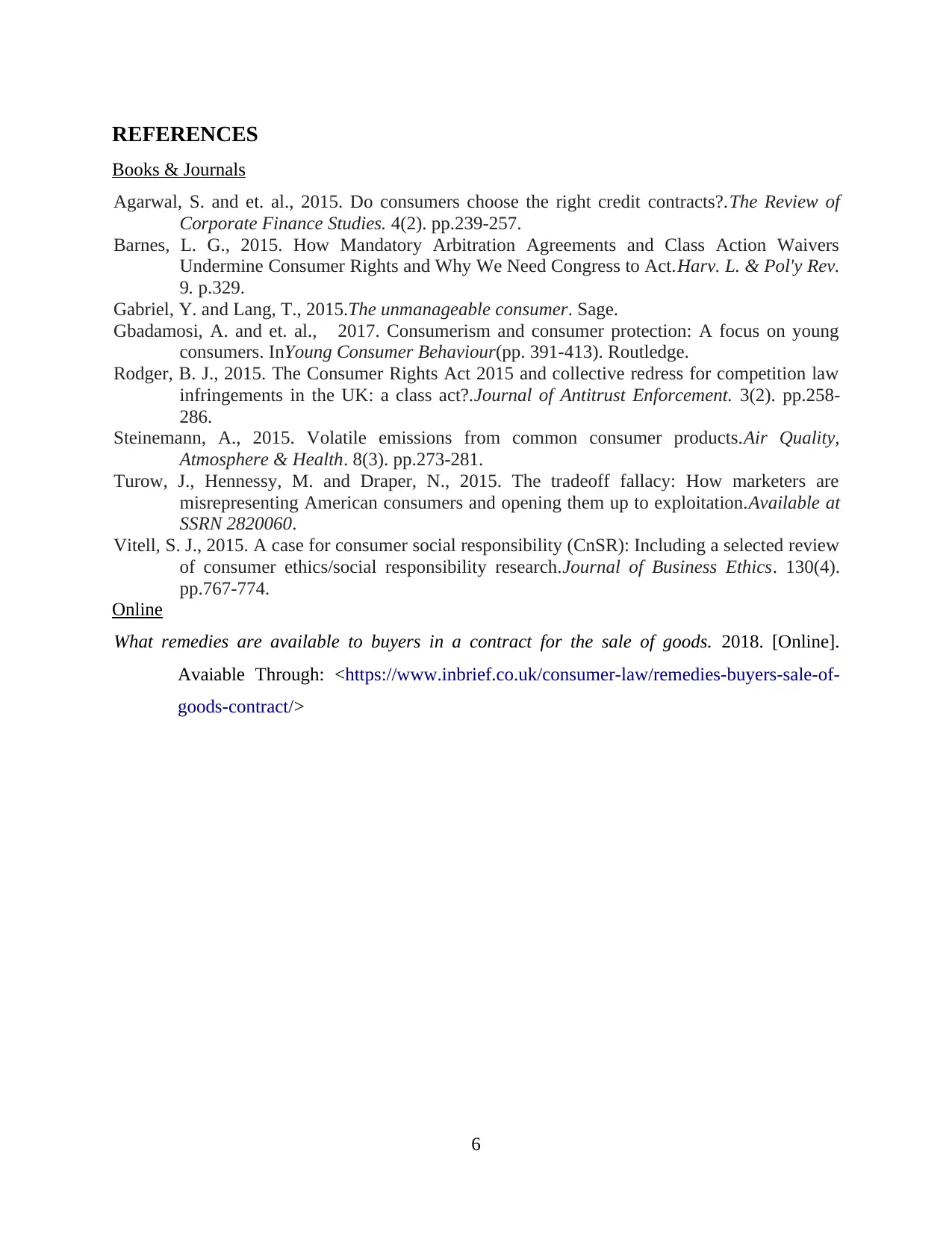
REFERENCES
Books & Journals
Agarwal, S. and et. al., 2015. Do consumers choose the right credit contracts?.The Review of
Corporate Finance Studies. 4(2). pp.239-257.
Barnes, L. G., 2015. How Mandatory Arbitration Agreements and Class Action Waivers
Undermine Consumer Rights and Why We Need Congress to Act.Harv. L. & Pol'y Rev.
9. p.329.
Gabriel, Y. and Lang, T., 2015.The unmanageable consumer. Sage.
Gbadamosi, A. and et. al., 2017. Consumerism and consumer protection: A focus on young
consumers. InYoung Consumer Behaviour(pp. 391-413). Routledge.
Rodger, B. J., 2015. The Consumer Rights Act 2015 and collective redress for competition law
infringements in the UK: a class act?.Journal of Antitrust Enforcement. 3(2). pp.258-
286.
Steinemann, A., 2015. Volatile emissions from common consumer products.Air Quality,
Atmosphere & Health. 8(3). pp.273-281.
Turow, J., Hennessy, M. and Draper, N., 2015. The tradeoff fallacy: How marketers are
misrepresenting American consumers and opening them up to exploitation.Available at
SSRN 2820060.
Vitell, S. J., 2015. A case for consumer social responsibility (CnSR): Including a selected review
of consumer ethics/social responsibility research.Journal of Business Ethics. 130(4).
pp.767-774.
Online
What remedies are available to buyers in a contract for the sale of goods. 2018. [Online].
Avaiable Through: <https://www.inbrief.co.uk/consumer-law/remedies-buyers-sale-of-
goods-contract/>
6
Books & Journals
Agarwal, S. and et. al., 2015. Do consumers choose the right credit contracts?.The Review of
Corporate Finance Studies. 4(2). pp.239-257.
Barnes, L. G., 2015. How Mandatory Arbitration Agreements and Class Action Waivers
Undermine Consumer Rights and Why We Need Congress to Act.Harv. L. & Pol'y Rev.
9. p.329.
Gabriel, Y. and Lang, T., 2015.The unmanageable consumer. Sage.
Gbadamosi, A. and et. al., 2017. Consumerism and consumer protection: A focus on young
consumers. InYoung Consumer Behaviour(pp. 391-413). Routledge.
Rodger, B. J., 2015. The Consumer Rights Act 2015 and collective redress for competition law
infringements in the UK: a class act?.Journal of Antitrust Enforcement. 3(2). pp.258-
286.
Steinemann, A., 2015. Volatile emissions from common consumer products.Air Quality,
Atmosphere & Health. 8(3). pp.273-281.
Turow, J., Hennessy, M. and Draper, N., 2015. The tradeoff fallacy: How marketers are
misrepresenting American consumers and opening them up to exploitation.Available at
SSRN 2820060.
Vitell, S. J., 2015. A case for consumer social responsibility (CnSR): Including a selected review
of consumer ethics/social responsibility research.Journal of Business Ethics. 130(4).
pp.767-774.
Online
What remedies are available to buyers in a contract for the sale of goods. 2018. [Online].
Avaiable Through: <https://www.inbrief.co.uk/consumer-law/remedies-buyers-sale-of-
goods-contract/>
6
1 out of 8
Related Documents
Your All-in-One AI-Powered Toolkit for Academic Success.
+13062052269
info@desklib.com
Available 24*7 on WhatsApp / Email
![[object Object]](/_next/static/media/star-bottom.7253800d.svg)
Unlock your academic potential
Copyright © 2020–2025 A2Z Services. All Rights Reserved. Developed and managed by ZUCOL.





